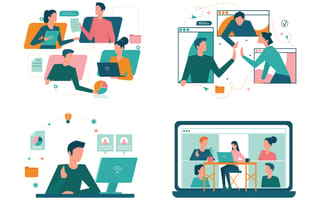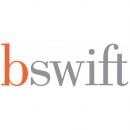
“How do we build and maintain a collaborative, informative and fun company culture that works even in a remote setting?”
As a large number of the country’s workforce continues to work remotely due to the pandemic, the question above is one HR leaders all over have sought answers to.
And although there’s no one-size-fits-all solution to remote culture, leaders have certainly gotten creative. Many have implemented ‘lunch and learns’ to discuss current events, recognition programs to show employee appreciation, virtual talent shows with employee-led bands — and the list doesn’t stop there.
In order to get a pulse of how HR leaders are keeping company culture alive in a remote environment, Built In Chicago caught up with four local companies. We asked them to describe the most notable change they’ve seen since transitioning to a remote setting, a culture-building ritual they’ve kept alive and any advice they have for other companies looking for new ways to build and maintain culture.
Epsilon is a marketing technology company that focuses on CRM, digital media, and loyalty and email programs. One of the ways they keep their culture alive in a remote work environment is through frequent video check-ins, which include live performances from their Chicago-based employee band, Chief Talent Officer Laurie Fry said.
What’s the most notable change you've seen in your company culture since transitioning to remote work?
“Taking care together” is a mantra we fully embraced in 2020, focusing on our employees’ physical and mental health. We check in together and we check out together — we’ve always had a family feeling within our office culture. Remote work has only strengthened and extended that bond, using video to check-in with colleagues across cities and countries for a more personal connection. We’ve also implemented days of rest to give our people collective time off. You don’t have to worry about checking email because everyone checks out together and is respectful of the time away from work.
A common set of values will act as guiding principles to pull your organization together and see you through a crisis.”
What’s one culture-building ritual your company has kept alive since going remote?
We’ve worked hard to continue engaging the communities we live and work in. For example, members of our Chicago-based employee band are still playing together and finding unique and creative ways to not only bring music to our associates but incorporate new members from outside the city. Our “Season of Service” has always been an important way to give back by donating time, money or goods (with a friendly office competition that brings our people together), so we’ve made sure to keep the spirit of the program alive with people safely at home.
What’s the most important piece of advice you’d share with other companies that are looking for new ways to build and maintain culture right now?
It’s important that leadership look at what their organization believes in, the values that drive their people and ultimately their company’s success. A common set of values will act as guiding principles to pull your organization together and see you through a crisis.
Fintech company OppLoans provides consumers access to credit thanks to its personalized program that involves quick approvals, fast funding and low-interest rates. Chief People Officer Karishma Patel Buford said that transitioning to a remote setting prompted the company to launch Project Opptimism, a program designed to keep employees connected, engaged and supported.
What’s the most notable change you’ve seen in your company culture since transitioning to remote work?
We’ve invested more in our employee experience, especially with the increased need for more remote flexible work. To do this, we need to always have a pulse on how employees feel. It takes ongoing effort and focus — from the first day of recruiting and onboarding to after an employee leaves the company. In fact, we received our highest scores so far for virtual onboarding — 93 percent of new hires feel welcomed and 97 percent feel excited about their new role.
By investing in our employee experience, we’ve also strengthened the way we communicate as a company. In response to the pandemic, we increased how we communicate with an emphasis on transparency, frequency and authenticity to keep employees connected and informed. We think through how changes impact employees in different ways especially with everyone virtual. We ask ourselves, “Are we sending the optimal cadence of communications through the right channels? Do our employees trust and understand the ‘why’ with our leadership decisions? How are we doing in terms of how, when, and about what we communicate?”
We found that we’re excelling with the highest employee survey scores we’ve ever received — 95 percent of respondents said they believe our internal communications have been effective. Additionally, 94 percent said they trusted senior leadership to make good decisions regarding the health crisis, and 93 percent said they were proud to tell others about OppLoans’ actions during this time.
What’s one culture-building ritual your company has kept alive since going remote?
In 2020, employees faced so many external pressures. We recognized this and invested in recreating meaningful, organic connections while also driving a culture change toward a mentally healthy workplace. By practicing our core principles remotely, we expect to return to an office setting with a stronger, mentally healthy work culture.
Project Opptimism arose from our need to keep employees meaningfully connected, engaged and supported in a refreshed digital format. We’ve traded lunch events, massage days and game nights for virtual lunch and learns, online fitness Fridays and a remote talent show — our most highly attended event! But we also took our culture-building rituals a step further to acknowledge the realities of this year. We experienced a global pandemic that was marked by racial injustice, political divisiveness and profound isolation — which stripped away the resilience many of us find in human connection. In response, OppLoans took the dollars spent on in-person benefits and redistributed them in a highly tailored way to address two stressors: mental health and parental responsibilities.
Starting in July 2020, we reallocated funds to our new employee benefit, Fringe. Every employee received 1,000 points equivalent to $200. We subsidized 10 services by 75 percent — five mental health and couples therapy services and five childcare services. We hosted a DEI speaker series with five speakers who discussed mental health, coping and racial injustice, including conversations led by Joyce Marter, a licensed psychotherapist and mental health expert, and Sarah Lewis, bestselling author of “The Rise.” We also encouraged employees to use time off through our staycation campaign — including sharing photos and creative at-home vacation ideas via a dedicated Slack channel.
Building and maintaining culture is not just about connection — it needs to be meaningful, impactful and oftentimes vulnerable.”
As we’ve substituted conference rooms for virtual meetings, an entirely new ritual we’ve started honoring is our set of meeting commitments. Meeting exhaustion has hit a new high in our remote world due in part to Zoom fatigue, minimal breaks and an inability to have in-person moments of connection and collaboration.
To improve engagement and productivity, we created a task force to define a set of meeting commitments based on best practices and employee recommendations. To measure success, we surveyed employees on meeting effectiveness before and after launch. Our scores significantly improved in the areas of clear roles and goals with the right members attending. Initially, respondents perceived that only half of the meetings they attended had clarity, purpose and relevance. In two months, we improved that percentage for respondents to 80 percent of the meetings they attended.
What’s the most important piece of advice you'd share with other companies that are looking for new ways to build and maintain culture right now?
Leaders need to ask, “How do we foster meaningful moments between colleagues that might not have happened otherwise?” Building and maintaining culture is not just about connection — it needs to be meaningful, impactful and, oftentimes, vulnerable. Our employees’ time is not limitless and their mindshare is not endless.
At OppLoans, one of the most meaningful and impactful moments of connection was born from leaning in to a difficult, vulnerable moment. Our business resource group, Oppt for Black Excellence, organized “Grieving While Black” in response to mourning the murder of George Floyd. The company-wide listening sessions prioritized Black voices while sharing ways in which allies could actively demonstrate allyship. The response to these powerful conversations was overwhelmingly positive, with many employees noting the lasting impact of the experience. We must find ways to recreate these meaningful moments of connection through vulnerability, empathy and compassion. This will be a large part of our work in 2021 integrated with both leadership development and diversity, equity and inclusion strategies.
The last piece of advice I would offer to companies is to prioritize and protect the employee experience with an integrated strategy — just as you would for your customer experience strategy. I’m proud to say OppLoans is ahead of the game because we hired an employee experience lead to ensure a successful transition to a flexible workforce in 2021 and beyond. Our goal is to treat our employees like our customers, elevating their experience at work wherever they reside. This role will be the eyes and ears of what the experience is, what it should be and will help us close that gap. While we’re still learning, we know staying focused on curating an amazing employee experience will drive new value for our employees as we evolve into our next chapter and the new normal.
IMC is a proprietary trading firm and market maker that trades primarily on the basis of data and algorithms. Since transitioning to remote, IMC has been able to keep its fun and collaborative environment alive through virtual social events such as weekly trivia, exercise classes, painting nights and even meet and greets with each other’s families, Interim Head of Human Resources Annalise Coffman said.
What’s the most notable change you've seen in your company culture since transitioning to remote work?
Creating a great company culture has always been a strategic objective of our organization and our culture continues to revolve around our people. Since transitioning to remote work, our teams have all stepped up to take care of and look out for each other. We’ve always been a collaborative environment, however, we’ve really seen people rally around each other and step up in remarkable ways. Remote work has emphasized the value of collaboration and teamwork at IMC and our employees are getting creative to ensure this sense of camaraderie continues outside of the office. There had been some understandable skepticism and uncertainty around our quick transition to working from home. Still, with our teams’ effort and collaboration, the move to working remotely went better than we ever could have expected.
We know any company’s growth, success or failure will be due to its people and it’s critical, especially in times like these, that we put them first.”
What’s one culture-building ritual your company has kept alive since going remote?
Social events and getting together on Fridays after work have always been a big part of our culture. We’re lucky that many of our employees are friends outside of work and we try to create a lot of opportunities for employees to socialize and spend time together. Since going remote, our social activities have continued, but we’ve had to get creative with what we offer in order to adapt. We have an incredible events team and every week they’re putting on something new and fun. On Zoom, we have weekly trivia, exercise classes, cooking classes, cocktail classes, painting events and several events for our employees’ children and their families. It’s been fun to virtually “meet” each other’s families (including pets!) and still have these opportunities to connect and socialize.
What’s the most important piece of advice you’d share with other companies that are looking for new ways to build and maintain culture right now?
This year has been stressful for everyone and we must take care of our people and put their health and well-being first. We’ve made an effort to listen to our teams and be intentional about maintaining and adjusting our culture in response to their feedback. We know any company’s growth, success or failure will be due to its people and it’s critical, especially in times like these, that we put them first.
Healthtech company bswift helps employers pick a benefits administration partner that’s tailored to their respective needs. To keep its appreciative culture alive in a remote setting, Chief Fun Officer Patrick McGarrity said that they implemented a “High 5” program where employees give each other thoughtful notes of recognition that can even be redeemed for prizes.
What’s the most notable change you’ve seen in your company culture since transitioning to remote work?
Our values of “Higher Standards,” “Greater Accountability” and “More Fun” have always encouraged colleagues to be supportive team players. This includes motivating each other to achieve higher standards, stepping in to help even when a task may be outside our everyday responsibilities and offering constructive feedback to encourage continual improvement. After the transition to remote, we’ve been pleased to see employees take these efforts to the next level and show support in new and unique ways. This includes being understanding of personal differences in the adjustment to remote work, brainstorming ideas to stay in touch with their teams and helping to create and participating in virtual employee groups.
Our engagement team has also gone above and beyond to develop creative initiatives to foster a supportive and engaging remote environment. Bswifters have been involved in this effort by sharing ways they’re staying connected with family and friends, which our team has been able to leverage for our organization. With the work of our engagement team and supportive nature of our bswifters, we’ve been able to better adapt our culture to the remote environment and employee needs.
By hearing firsthand from your workforce and applying their feedback, you can create a remote company culture that is empathetic and engaging.”
What’s one culture-building ritual your company has kept alive since going remote?
One ritual we’ve adapted is our “High 5” program, where employees give thoughtful notes of recognition to one another and can redeem them for prizes. Since going remote, expressing recognition is more important now than ever, so we created this program to keep the tradition going. Our engagement team has worked hard to create a virtual employee engagement plan, which is new this year. Normally, employees participated in weekly engagement, educational and volunteer activities — now, our team has transformed many existing in-office activities to be remote-friendly and created new efforts unique to our virtual environment.
In 2020, we participated in a Letters to Santa program for children in need, held a virtual talent show, sent virtual messages of appreciation to frontline workers, coordinated a recipe exchange, celebrated Customer Service Appreciation week with virtual wellness activities for our employees and much more. A major part of the bswift culture is ensuring employees know and feel they’re valued. By recognizing them and providing unique engagement opportunities, we can communicate our appreciation for their hard work in both normal and challenging times.
What’s the most important piece of advice you’d share with other companies that are looking for new ways to build and maintain culture right now?
Talk to your employees, listen thoughtfully and adapt. This is a unique and challenging time, and employees have all been navigating their new work environments in different ways throughout the year. Send out an employee engagement survey and regularly ask for feedback on your efforts to incorporate your company culture into the remote work environment. Ask questions about how they would prefer to be engaged, maintain a connection to your company’s mission and values, and keep in touch with their teams and coworkers.
In addition to the stress of adapting to a remote environment, the pandemic has also brought on feelings of isolation and loneliness for many. Now more than ever, employees need a strong sense of connection and belonging and your efforts can help ensure this in the workplace. At the end of the day, a strong work culture acts as the glue connecting everyone within your organization. It can help to build trust and encourage teamwork, regardless of the challenges everyone is being faced with individually. By hearing firsthand from your workforce and applying their feedback, you can create a remote company culture that is empathetic and engaging.













